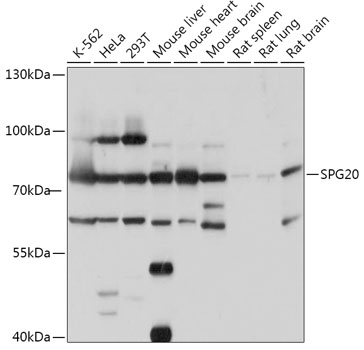Cell Biology Antibodies 13
Anti-SPG20 Antibody (CAB17653)
- SKU:
- CAB17653
- Product Type:
- Antibody
- Reactivity:
- Human
- Reactivity:
- Mouse
- Reactivity:
- Rat
- Host Species:
- Rabbit
- Isotype:
- IgG
- Antibody Type:
- Polyclonal Antibody
- Research Area:
- Cell Biology
Description
| Antibody Name: | Anti-SPG20 Antibody |
| Antibody SKU: | CAB17653 |
| Antibody Size: | 20uL, 50uL, 100uL |
| Application: | WB |
| Reactivity: | Human, Mouse, Rat |
| Host Species: | Rabbit |
| Immunogen: | Recombinant fusion protein containing a sequence corresponding to amino acids 1-350 of human SPG20 (NP_055902.1). |
| Application: | WB |
| Recommended Dilution: | WB 1:500 - 1:2000 |
| Reactivity: | Human, Mouse, Rat |
| Positive Samples: | K-562, HeLa, 293T, Mouse liver, Mouse heart, Mouse brain, Rat spleen, Rat lung, Rat brain |
| Immunogen: | Recombinant fusion protein containing a sequence corresponding to amino acids 1-350 of human SPG20 (NP_055902.1). |
| Purification Method: | Affinity purification |
| Storage Buffer: | Store at -20°C. Avoid freeze / thaw cycles. Buffer: PBS with 0.02% sodium azide, 50% glycerol, pH7.3. |
| Isotype: | IgG |
| Sequence: | MEQE PQNG EPAE IKII REAY KKAF LFVN KGLN TDEL GQKE EAKN YYKQ GIGH LLRG ISIS SKES EHTG PGWE SARQ MQQK MKET LQNV RTRL EILE KGLA TSLQ NDLQ EVPK LYPE FPPK DMCE KLPE PQSF SSAP QHAE VNGN TSTP SAGA VAAP ASLS LPSQ SCPA EAPP AYTP QAAE GHYT VSYG TDSG EFSS VGEE FYRN HSQP PPLE TLGL DADE LILI PNGV QIFF VNPA GEVS APSY PGYL RIVR FLDN SLDT VLNR PPGF LQVC DWLY PLVP DRSP VLKC TAGA YMFP DTML QAAG CFVG VVLS SELP EDDR ELFE DLLR QMSD LRLQ ANWN RAEE ENEF QI |
| Gene ID: | 23111 |
| Uniprot: | Q8N0X7 |
| Cellular Location: | |
| Calculated MW: | 72kDa |
| Observed MW: | 73kDa |
| Synonyms: | SPARTIN, TAHCCP1, SPG20, spartin |
| Background: | This gene encodes a protein containing a MIT (Microtubule Interacting and Trafficking molecule) domain, and is implicated in regulating endosomal trafficking and mitochondria function. The protein localizes to mitochondria and partially co-localizes with microtubules. Stimulation with epidermal growth factor (EGF) results in protein translocation to the plasma membrane, and the protein functions in the degradation and intracellular trafficking of EGF receptor. Multiple alternatively spliced variants, encoding the same protein, have been identified. Mutations associated with this gene cause autosomal recessive spastic paraplegia 20 (Troyer syndrome). [provided by RefSeq, Nov 2008] |
| UniProt Protein Function: | SPG20: May be implicated in endosomal trafficking, or microtubule dynamics, or both. Defects in SPG20 are the cause of spastic paraplegia autosomal recessive type 20 (SPG20); also known as Troyer syndrome (TRS). Spastic paraplegia is a neurodegenerative disorder characterized by a slow, gradual, progressive weakness and spasticity of the lower limbs. Rate of progression and the severity of symptoms are quite variable. Initial symptoms may include difficulty with balance, weakness and stiffness in the legs, muscle spasms, and dragging the toes when walking. In some forms of the disorder, bladder symptoms (such as incontinence) may appear, or the weakness and stiffness may spread to other parts of the body. SPG20 is characterized by dysarthria, distal amyotrophy, mild developmental delay and short stature. |
| UniProt Protein Details: | Protein type:Unknown function Chromosomal Location of Human Ortholog: 13q13.3 Cellular Component: cytoplasm; midbody; mitochondrial outer membrane; plasma membrane Molecular Function:protein binding; ubiquitin protein ligase binding Biological Process: abscission; cell division; regulation of mitochondrial membrane potential Disease: Spastic Paraplegia 20, Autosomal Recessive |
| NCBI Summary: | This gene encodes a protein containing a MIT (Microtubule Interacting and Trafficking molecule) domain, and is implicated in regulating endosomal trafficking and mitochondria function. The protein localizes to mitochondria and partially co-localizes with microtubules. Stimulation with epidermal growth factor (EGF) results in protein translocation to the plasma membrane, and the protein functions in the degradation and intracellular trafficking of EGF receptor. Multiple alternatively spliced variants, encoding the same protein, have been identified. Mutations associated with this gene cause autosomal recessive spastic paraplegia 20 (Troyer syndrome). [provided by RefSeq, Nov 2008] |
| UniProt Code: | Q8N0X7 |
| NCBI GenInfo Identifier: | 50401600 |
| NCBI Gene ID: | 23111 |
| NCBI Accession: | Q8N0X7.1 |
| UniProt Secondary Accession: | Q8N0X7,O60349, Q86Y67, Q9H1T2, Q9H1T3, |
| UniProt Related Accession: | Q8N0X7 |
| Molecular Weight: | 72,833 Da |
| NCBI Full Name: | Spartin |
| NCBI Synonym Full Names: | spastic paraplegia 20 (Troyer syndrome) |
| NCBI Official Symbol: | SPG20 |
| NCBI Official Synonym Symbols: | SPARTIN; TAHCCP1 |
| NCBI Protein Information: | spartin |
| UniProt Protein Name: | Spartin |
| UniProt Synonym Protein Names: | Spastic paraplegia 20 protein; Trans-activated by hepatitis C virus core protein 1 |
| Protein Family: | Spartin |
| UniProt Gene Name: | SPG20 |
| UniProt Entry Name: | SPG20_HUMAN |







